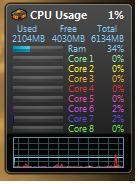It would not be accurate to call the Core i7 an octo-core processor; it would be accurate to call it a quad-core processor with hyper-threading. As we learned back with Pentium 4s, hyper-threading doesn't come close to providing the benefits that a native dual-core (in the case of Pentium 4s) or octo-core (in the case of Core i7s) would provide. In addition, even if the Core i7 was an octo-core processor, there are very, very few programs that would utilize eight cores. The Core i7, however, bests any AMD CPU even in programs that only utilize one or two cores. So, the number of cores and/or the presence of hyper-threading clearly aren't the "biggest reason[s]" why the Core i7 outperforms any AMD CPU. The actual reason, as I stated earlier in this topic, is that the Core i7 microarchitecture is far superior. That is, the way the Core i7 handles instructions is more efficient than how AMD CPUs handle instructions.The i7 is way faster than the AMD 955. Probably the biggest reason for this is that, while both are quad-core processors, the i7 is hyper-threaded, which means that it can support two data streams per core. It is accurate to call the Core i7 an octo-core processor for this reason, since each physical core acts as two logical cores. There are other more technical reasons that the i7 outperforms any AMD chip as well, but this is probably the biggest reason.
Again, the performance discrepancy comes largely from differences in microarchitecture, not from the things listed. Additional cores only provide benefit in programs that can utilize multiple cores, yet the Core 2 and Core i7 CPUs still beat Pentium 4s in applications which only utilize one core. Cache size causes a small difference, though it doesn't come close to accounting for the large performance difference we see, and only 64-bit programs running on a 64-bit OS will take advantage of 64-bit instructions on the CPU, yet the Core 2 and Core i7s still beat the Pentium 4s in 32-bit programs.Pentium 4 processors operated in the 3.0-4.0 GHz range (maybe even more than 4.0; I can't quite remember), while today's Core 2 and Core i7 processors operate around 2.5-3.2 GHz, yet the modern processors are, obviously, many times faster than the Pentium. This comes from such aspects as being multi-core, cache sizes, word size (x86 vs x64), etc. If you are comparing two processors in the same family, for example two Core i7 processors, however, the operating frequency becomes a more meaningful point of comparison.
As someone who has looked into Windows 7 RC, I can say it is completely stable, and just as backward-compatible as Vista. That is, anything that runs on Vista will run on Windows 7. The later point is a good one though. Either way, you will end up spending about the same amount of money.As for your OS question, I wouldn't advise having ONLY an RC or beta operating system on a machine, just as an issue of principle. More often than not, there's a reason why it's a release candidate and it's not quite ready to be a full release. Moreover, I haven't looked into Windows 7 very much, but I would be afraid of running into some backward-compatibility issues. I do have a couple friends who use Windows 7 as their primary OS and they report some minor problems with networking, but generally it seems to be stable. If it's money you're concerned about here, keep in mind that even if you go with the Windows 7 RC, you'll inevitably have to buy the real Windows 7 release once it comes out. Which is not a problem really, just worth pointing out that you'll either spend money now on Vista then get Windows 7 free later, or save money now but then have to buy Windows 7 later. If the cost of Vista is getting in the way of the hardware you want, the second option might be better.
The OP stated in his first post that he was building the computer for music production and running digital audio tools, which may very well require, or at least function better, with a particular discrete sound card.Also if the build you want is really close to budget, I would highly suggest holding off on the sound card unless you feel it is very important, as the sound card is the one part of your build that is totally optional. Most onboard sound chipsets these days are quite good and will certainly tide you over for general computing purposes until you can afford a discrete card. I currently have my Logitech 5.1 surround sound speaker system connected to my onboard sound and have been totally satisfied with it.
rocknje, if the Core i7 fits in your budget at $200, I'd definitely recommend you get it. As stated earlier, what you do with the operating system is up to you, as you will end up paying the same in the end.
Thank you for this explanation. I am understanding more now. Well, I purchased the Core i7 $199 from Microcenter Fri Morning and I am going to be picking up Sat. Morning. For that price, I had to go with this. Now, I need to decide on motherboard, ram etc. I will update this thread in more detail on Sat.
Thanks again.
















 Sign In
Sign In Create Account
Create Account

